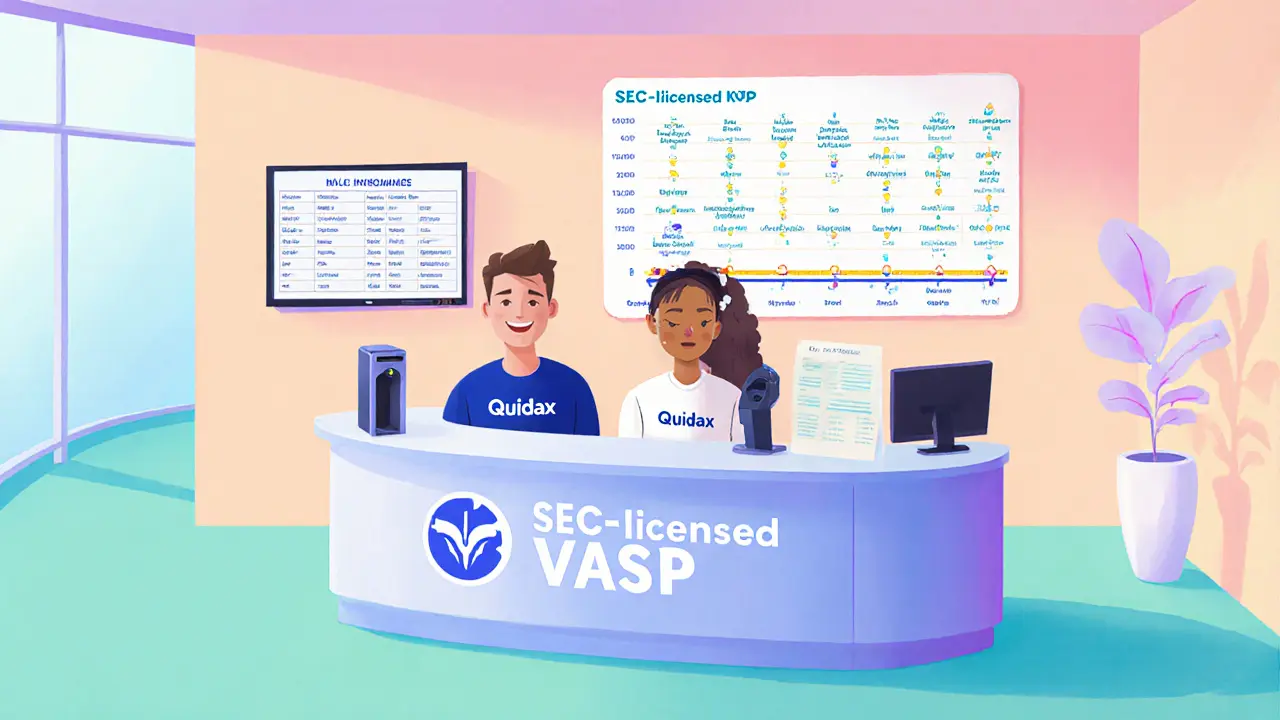Nigeria Crypto Compliance Checker
Your Compliance Report
When you hear "crypto restrictions" in Nigeria, the first thing that comes to mind is the old banking bans and the fear of frozen accounts. The good news? Those strict limits have shifted dramatically since the Investments and Securities Act (ISA) 2025 was signed on March 25, 2025. Nigeria’s crypto regulatory framework now treats digital assets as securities under a clear, unified set of rules, giving users a legal path to trade, invest, and hold crypto without slipping into gray‑area territory. Below is the play‑by‑play you need to stay on the right side of the law while still enjoying the freedom crypto offers.
Quick Take
- ISA 2025 recognizes crypto as a financial security; the SEC is the main regulator.
- Only SEC‑licensed VASPs (e.g., Quidax, Busha) can offer banking services.
- Individual users must complete KYC, file tax on gains after Jan12026, and keep transaction records.
- Peer‑to‑peer (P2P) remains legal, but avoid unlicensed platforms that sell without audit trails.
- Stay updated - the SEC may soon extend oversight to DeFi and stablecoins.
1. The Legal Landscape After ISA2025
The Investments and Securities Act 2025 (ISA2025) replaced the outdated 2007 version and officially declared every digital token a "security" under Nigerian law. This shift did three things:
- Gave crypto a legal identity. Tokens are now assets you can own, trade, and report like stocks.
- Centralized oversight. The Securities and Exchange Commission (SEC) acts as the primary regulator for all crypto activities, working hand‑in‑hand with the Central Bank of Nigeria (CBN) oversees monetary stability and issues VASP guidelines.
- Set a licensing pipeline. Virtual Asset Service Providers (VASPs) must register with the SEC, pass AML/KYC checks, and prove banking integration capability.
Because the SEC now has enforcement power, any platform operating without a licence faces possible shutdown, fines, and a ban on banking ties.
2. Pick a Licensed VASP - Your Safe Gateway
Not all exchanges are equal. Licensed VASPs enjoy banking access, insurance on user funds, and legal protection. Below is a snapshot of the most reputable, SEC‑approved platforms as of October2025.
| Platform | License Status | Bank Integration | KYC Process | Typical Fees |
|---|---|---|---|---|
| Quidax | SEC‑licensed | Full NGN accounts | Video‑ID + biometric | 0.2% per trade |
| Busha | SEC‑licensed | Direct NGN deposits | Document upload + face‑match | 0.25% per trade |
| Binance NG | Pending (awaiting SEC review) | Limited - no NGN accounts | Standard e‑mail verification | 0.1% per trade |
| Unlicensed P2P hubs | None | None | Self‑reported | Varies |
Stick with Quidax or Busha for the smoothest experience. They both support NGN wire transfers, have SEC‑approved AML programs, and provide a clear audit trail for tax reporting.
3. Individual Compliance - KYC, AML, and Tax
Even if you’re just a hobbyist, the law expects you to prove where your money comes from and to file taxes on any profit. Here’s the checklist you need to follow:
- KYC/AML. Upload a government‑issued ID, proof of address, and a selfie for facial verification. The SEC’s VASP guidelines require verification within 24hours of account creation.
- Record‑keeping. Keep a spreadsheet (or use a crypto tax app) that logs: date, asset, amount bought, amount sold, price in NGN, and the exchange used. The data must be retained for at least five years.
- Tax filing. Starting Jan12026, crypto gains are taxed as property. For individuals, the personal income tax cap is 25% on net profits. Corporations face 20% or 30% corporate tax plus 7.5% VAT on fees. Use the Nigerian Tax Administration Act 2025 to understand filing deadlines and deductible expenses.
- Reporting. Your licensed VASP will issue a monthly transaction summary. Upload it with your annual tax return; the Federal Inland Revenue Service (FIRS) can now cross‑check against SEC data.
Failing any of these steps can trigger audits, fines, or a freeze of your exchange account.

4. When Licensed Services Are Unavailable - Safe P2P Strategies
There are times when a licensed platform might be down, or you need to move funds quickly without NGN banking delays. Peer‑to‑peer (P2P) trades are still legal, but you must treat them like any other financial transaction:
- Only trade with users who have verified profiles on a reputable P2P marketplace (e.g., Binance P2P, Paxful). Look for “✅ Verified” badges.
- Insist on escrow. The platform should hold the buyer’s funds until you confirm receipt of payment.
- Avoid cash‑only handovers - they leave no paper trail and can be flagged as suspicious under the EFCC’s anti‑money‑laundering mandate.
- Document the trade: screenshots, payment receipts, and chat logs. Store them alongside your exchange records.
- Report large trades (over ₦500,000) to the Economic and Financial Crimes Commission (EFCC) as part of Nigeria’s AML framework if you suspect illicit activity.
Following these steps keeps you in the clear while still giving you flexibility.
5. Keeping Ahead of Future Regulation
The SEC has signaled that the next wave of oversight will cover DeFi protocols, stablecoins, and NFT marketplaces that deal with investment‑grade tokens. Here’s how to future‑proof your crypto habit:
- Monitor SEC releases. Subscribe to the SEC’s monthly bulletin (usually released on the 10th of each month).
- Join industry groups. The Nigerian FinTech Association holds quarterly webinars on regulatory updates.
- Use modular wallets. Choose wallets that let you switch between custodial (exchange) and non‑custodial modes, so you can move assets off‑exchange if a new rule limits a particular token.
- Stay diversified. Don’t put all your capital in a single token class; spreading across BTC, ETH, and regulated stablecoins can reduce risk if a specific asset faces tighter rules.
Being proactive means you won’t be caught off‑guard when the next amendment lands.
6. Common Pitfalls and How to Avoid Them
Even seasoned traders slip up. Below are the top three mistakes Nigerian users make and the quick fixes:
| Pitfall | Consequence | Fix |
|---|---|---|
| Using unlicensed exchanges | Account freeze, loss of funds | Switch to SEC‑licensed VASP immediately |
| Skipping KYC | Regulatory audit, possible fines | Complete full KYC on every platform you use |
| Not tracking taxable events | Under‑reported taxes, penalties | Log every trade; use a crypto‑tax app |
7. TL;DR - Your Cheat Sheet
- Only trade on SEC‑licensed VASPs (Quidax, Busha).
- Complete KYC, keep detailed transaction logs.
- Report crypto gains after Jan12026; max 25% personal tax.
- Use reputable P2P platforms with escrow when needed.
- Stay tuned to SEC newsletters for upcoming DeFi rules.
Frequently Asked Questions
Do I need a license to buy Bitcoin in Nigeria?
No, individuals don’t need a license. However, you must use a SEC‑licensed exchange or a verified P2P platform, complete KYC, and keep records for tax purposes.
What happens if I trade on an unlicensed exchange?
The SEC can freeze your account and the CBN may block associated bank accounts. You also risk losing funds with no legal recourse.
When do I start paying tax on my crypto profits?
Tax liability begins on the first taxable event after January12026. Gains from selling, swapping, or using crypto to pay for services are taxable.
Can I hold crypto in a hardware wallet without a licence?
Yes. Personal custody of assets in a non‑custodial wallet isn’t regulated, but you still need to report any future sales for tax.
Will future DeFi rules affect my current holdings?
Possibly. The SEC plans to extend oversight to DeFi protocols. Keep an eye on official announcements and consider moving high‑risk DeFi assets to regulated tokenized products when they become available.


If you’re looking to stay compliant, start by verifying that your exchange bears the SEC licence; this alone shields you from most freeze‑risk scenarios, and the KYC process should be completed within 24 hours of registration, as mandated by the 2025 ISA, ensuring that you remain on the right side of the law, while also giving you peace of mind.
Consider the regulatory framework as a living contract with the state; it obliges you to record every transaction, yet it also grants you the right to hold assets in a non‑custodial wallet without a licence, provided you report gains later. The act of diligent bookkeeping becomes a form of self‑governance, reinforcing personal accountability. By aligning with licensed VASPs, you benefit from institutional safeguards. Simultaneously, retain control over private keys when you choose a hardware wallet. This balanced approach respects both legal obligations and individual sovereignty.
i dont think all dis is so big a deal, even if u use an unlicenced platform u can still move coin, just watch out for scams and dont get caught.
One must contemplate the ontological ramifications of delegating one's digital wealth to an entity lacking the imprimatur of the Securities Commission; such abdication may inadvertently enmesh the investor in clandestine machinations orchestrated by shadowy financial cabals.
Stick with Quidax or Busha for NGN deposits, and keep a spreadsheet of buy and sell dates-it makes tax filing painless.
Navigating Nigeria’s post‑ISA crypto framework can appear daunting at first glance, but a systematic approach demystifies the process.
Begin by selecting a SEC‑licensed VASP, as these platforms are obligated to implement robust AML/KYC protocols.
The licensing requirement not only safeguards your funds through bank integration but also ensures that your transaction data is auditable by the regulator.
Once registered, complete the identity verification within the stipulated 24‑hour window to avoid account restrictions.
Maintain a detailed ledger-recording date, asset, amount, price in NGN, and counterparties-to satisfy the five‑year retention rule.
This ledger becomes indispensable when preparing your annual tax return, where crypto gains are taxed as property at up to twenty‑five percent for individuals.
For corporate entities, the tax rate may rise to thirty percent, accompanied by applicable VAT on service fees.
Leverage the monthly transaction summary provided by your VASP; it streamlines the reporting process and minimizes manual entry errors.
Should your chosen platform experience downtime, reputable P2P marketplaces with escrow services can serve as a reliable fallback.
When employing P2P, insist on verified counterparties and retain screenshots of negotiations and payment confirmations.
Avoid cash‑only trades, as they leave no paper trail and may attract scrutiny under the EFCC’s anti‑money‑laundering mandate.
If you engage in large‑volume trades exceeding ₦500,000, consider filing a voluntary report with the EFCC to demonstrate good faith.
Stay abreast of upcoming SEC bulletins; they frequently announce extensions of oversight to DeFi protocols and tokenized assets.
Adopting a modular wallet that supports both custodial and non‑custodial modes can future‑proof your holdings against regulatory shifts.
By adhering to these practices, you minimize legal exposure while preserving the flexibility that crypto offers.
While the guidance is solid, the reality on the ground often diverges; many traders still rely on unlicensed peers because of lower fees, and that introduces hidden risks.
You've got the right idea-treat compliance like a habit, not a chore.
Updating your spreadsheet weekly keeps you ahead of tax deadlines.
Also, setting up alerts for SEC announcements can catch changes early.
Keep the optimism; the ecosystem is maturing.
One must also consider the covert influence of foreign entities seeking to manipulate the nascent regulatory framework, thereby compromising sovereign monetary autonomy.
Oh great, another checklist-because we all love paperwork.
If only bureaucracy could be as exciting as crypto.
Stay steady and keep documenting; the effort pays off when filing season rolls around.
The article repeats points.
Nothing new here.
If the SEC’s future directives target DeFi, early adopters may find their assets re‑classified, so diversification now could mitigate sudden policy shocks.